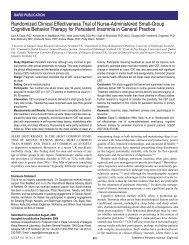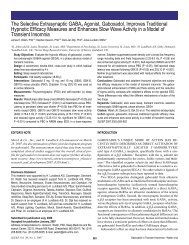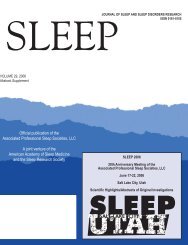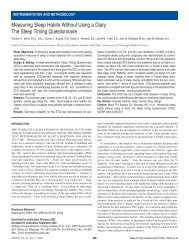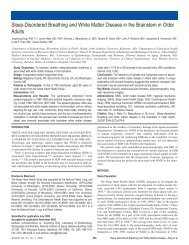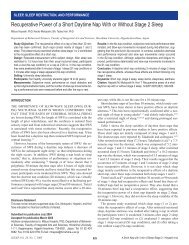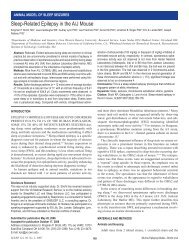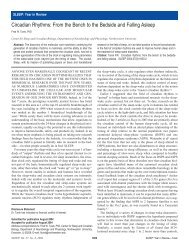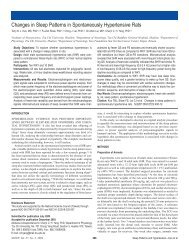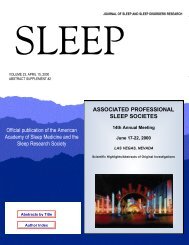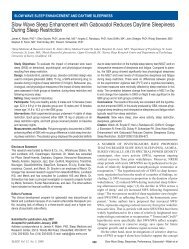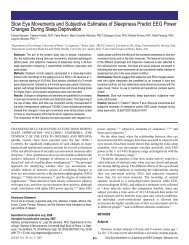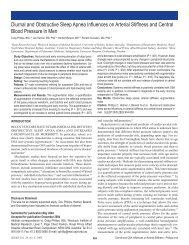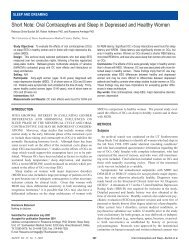SLEEP 2011 Abstract Supplement
SLEEP 2011 Abstract Supplement
SLEEP 2011 Abstract Supplement
Create successful ePaper yourself
Turn your PDF publications into a flip-book with our unique Google optimized e-Paper software.
B. Clinical Sleep Science XII. Sleep and Aging<br />
0886<br />
DIFFICULTY MAINTAINING <strong>SLEEP</strong> AND EARLY WAKE-UP<br />
TIMES ARE ASSOCIATED WITH VASCULAR DYSFUNCTION<br />
IN JAPANESE HEALTHY INDIVIDUALS<br />
Kadono M 1 , Shigeta M 2 , Hasegawa G 1 , Asano M 1 , Yamazaki M 1 ,<br />
Fukui M 1 , Nakamura N 1<br />
1<br />
Endocrinology and Metabolism, Kyoto Prefectural University of<br />
Medicine, Kyoto, Japan, 2 Department of Epidemiology for Community<br />
Health and Medicine, Kyoto Prefectural University of Medicine,<br />
Kyoto, Japan<br />
Introduction: Introduction: Previous investigations have shown sleep<br />
loss causes hypertension and atherosclerosis. Sleep fragmentation and<br />
earlier wake-up times characterize sleep patterns of older adults. Taken<br />
together, vascular dysfunction with aging could be associated with<br />
the age- related changes of sleep-wake patterns in forms of difficulty<br />
maintaining sleep and waking-up early . In the present study, we have<br />
cross-sectionally investigated whether self- reported difficulty sleep<br />
maintaining and habitual wake-up times are associated with higher<br />
blood pressure and vascular dysfunction.<br />
Methods: The current study included 2062 apparently healthy individuals<br />
(mean aged 57.2±10.1, 1074 male)who underwent general<br />
health screening test in a general hospital. Habitual patterns concerning<br />
sleep (bed times, wake-up times, and symptoms of difficulty initiating<br />
or maintaining sleep) on weekdays were recorded from answers on the<br />
questionnaire. Vascular condition was assessed by blood pressure and<br />
brachial-ankle pulse-wave velocity (PWV) value. Hypertension was<br />
defined as blood pressure ≥130/85 mmHg,and atherosclerosis was determined<br />
as the highest tertile of baPWV values. Multivariate logistic<br />
regression model, adjusted for variables including gender, age, sex, body<br />
mass index, blood pressure, sleep duration were applied.<br />
Results: Difficulty maintaining sleep was associated with increased<br />
prevalence of hypertension with adjusted odds ratio of 1.23(1.01-1.50).<br />
Wake-up times before 5:00 a.m. were associated with increased prevalence<br />
of hypertension and atherosclerosis with an adjusted odds ratio of<br />
1.48(1.06-2.07) and 1.83(1.12-2.99), respectively, compared to wake-up<br />
times after 5:00 a.m. Adjusting for sleep duration did not contribute to<br />
the association between difficulty maintaining, early waking, and vascular<br />
condition.<br />
Conclusion: Difficulty maintaining sleep and early wake-up times were<br />
strongly associated with vascular dysfunction. Age- associated sleep<br />
forms might influence vascular condition.<br />
0887<br />
MILD COGNITIVE IMPAIRMENT IN OLDER ADULTS IS<br />
NOT ASSOCIATED WITH SIGNIFICANT SUBJECTIVE<br />
<strong>SLEEP</strong> DISTURBANCE<br />
Vitiello MV 1,2,3 , Barsness SM 1 , Baker LD 1 , Merriam GM 2 , Borson S 1<br />
1<br />
Psychiatry and Behavioral Sciences, University of Washington,<br />
Seattle, WA, USA, 2 Medicine, University of Washington, Seattle, WA,<br />
USA, 3 Biobehavioral Nursing, University of Washington, Seattle, WA,<br />
USA<br />
Introduction: The disturbed sleep of Alzheimer’s disease (AD) patients<br />
has been well characterized even in early stages of the disease. Mild<br />
Cognitive Impairment (MCI) in older adults has recently been recognized<br />
as a pro-dromal phase of AD, opening the question of whether the<br />
sleep disturbances that characterize early stage AD might be present in<br />
MCI patients. To address this question we compared the subjective sleep<br />
quality of a group of amnestic MCI (aMCI) patients with a control group<br />
of healthy normal older adults.<br />
Methods: Fifty-seven aMCI patients (age 70.5 + 1.1 years (mean +<br />
SEM); 22 men and 35 women) and 69 Controls (age 66.3 + 0.9 years;<br />
30 men and 39 women) completed the Pittsburgh Sleep Quality Index<br />
(PSQI) as part of the baseline assessment of an ongoing randomized<br />
controlled trial. Groups were carefully screened to exclude major medi-<br />
cal conditions and primary sleep disorders and had similar levels of education<br />
and comparable body mass indices.<br />
Results: aMCIs did not report more subjective sleep disturbance than<br />
Controls for either PSQI total (5.7 + 0.4 versus 5.4 + 0.4, respectively)<br />
or subscale scores. Women tended to have higher PSQI scores than men,<br />
regardless of diagnosis, although such differences were also non-significant.<br />
Conclusion: Older adults with aMCI do not report significantly impaired<br />
subjective sleep quality relative to healthy older controls; despite<br />
the older age of the aMCIs potentially biasing in favor of more impaired<br />
sleep quality in that group. These findings indicate that, while MCI may<br />
be a pro-dromal phase of AD, either the changes in cognitive function,<br />
particularly memory, which are the hallmark of AD, occur sooner than<br />
changes in sleep quality, or that objective changes in sleep patterns, not<br />
measured in the current study, are not of sufficient magnitude to be reliably<br />
perceived by aMCI patients.<br />
Support (If Any): R01-AG025515 (MVV)<br />
0888<br />
DIFFERENCE IN LIPID PEROXIDATION<br />
CONCENTRATIONS IN ADULTS AND ELDERLY PATIENTS<br />
WITH OBSTRUCTIVE <strong>SLEEP</strong> APNEA SYNDROME (OSAS)<br />
Yagihara F, Lucchesi L, D’Almeida V, Sales L, Tufik S, Bittencourt LA<br />
Departamento de Psicobiologia, Universidade Federal de São Paulo,<br />
São Paulo, Brazil<br />
Introduction: The aging process and intermittent hypoxia observed in<br />
obstructive sleep apnea syndrome (OSAS) may lead to an increase in<br />
the generation of reactive oxygen species and to an increase in malondialdehyde<br />
(MDA) plasma concentrations. Studies that compare lipidic<br />
peroxidation in elderly and adult people with OSAS are scarce. Our aim<br />
was to evaluate the effect of age upon lipid peroxidation concentrations<br />
in adult and elderly men with OSAS.<br />
Methods: Male volunteers with ages between 25 and 75 years old were<br />
selected. Their body mass index (BMI) was under 40 kg/m2, and they<br />
had a clinic and polysomnographic diagnosis of OSAS. Each OSAS<br />
group had its own control group. They underwent blood analysis for<br />
lipid peroxidation evaluation.<br />
Results: Participants were divided into four groups: 13 adults with<br />
OSAS, 12 adult controls, 30 elderly OSAS and 27 elderly controls. According<br />
to apnea-hypopnea index (AHI), as expected, there were significant<br />
intra-group differences both in the adult group [controls: 5.7 (95%<br />
3.1-14.4) vs. OSAS=40.6 (95% 30.4-50.8)], and in the elderly group<br />
[controls:1.8 (95% 8-11.6) vs. OSAS=36.5 (95% 27.4-45.5)]. The elderly<br />
group with apnea had a higher mean MDA in relation to the elderly<br />
control group [2.9 nmol MDA/mL (95% 2.2-3.6) vs. 1.5 nmol MDA/mL<br />
(95% 0.9-2.2) respectively] and the adult apnea group [2.9 nmol MDA/<br />
mL (95% 2.2-3.6) vs. 1.5 nmol MDA/mL (95% 0.8-2.2) respectively].<br />
There were no differences between the elderly apnea and the adult control<br />
groups [2.9 nmol MDA/mL (95% 2.2-3.6) vs. 2.1 nmol MDA/mL<br />
(95%1.4-2.8), respectively].<br />
Conclusion: In our study we observed that in comparison with adults<br />
and controls, the elderly group with OSAS was influenced by two additive<br />
effects of oxidative stress, aging and OSAS, as suggested by the<br />
increase of lipid peroxidation.<br />
Support (If Any): AFIP, FAPESP/ CEPID and CNPq<br />
A303<br />
<strong>SLEEP</strong>, Volume 34, <strong>Abstract</strong> <strong>Supplement</strong>, <strong>2011</strong>



